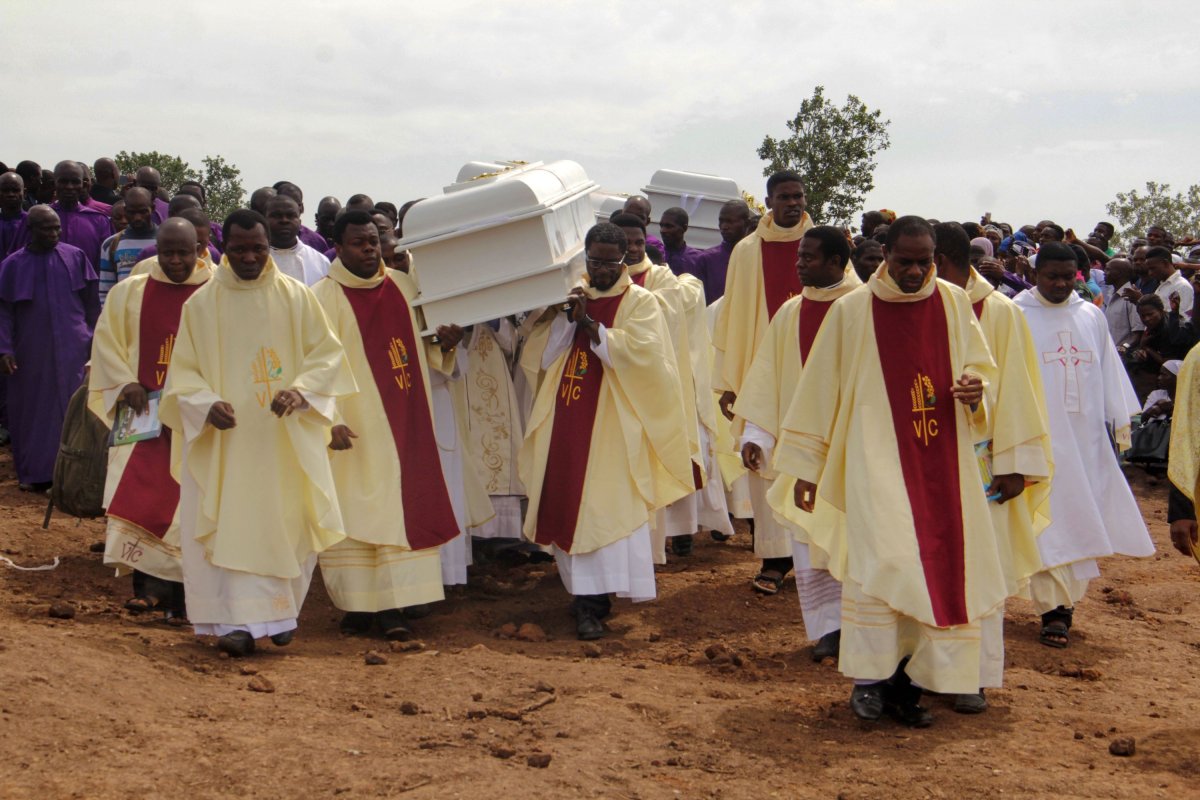Early on Sunday morning last week, armed assailants breached the rectory of Sts. Peter and Paul Catholic Church in the northern state of Niger. They shot the pastor, Fr. Isaac Achi, in the chest and set fire to the building with his remains still inside. They also shot another priest, Fr. Collins Omeh, as he fled the scene.
Omeh told The Pillar, an independent Catholic news agency, that Achi's body was "burnt beyond recognition inside the [parish rectory]."
This event, though horrifying, is not a strange one to the people of Nigeria. The International Society for Civil Liberties and Rule of Law, an investigative group headquartered in the southern state of Anambra, reported that more than 3,400 Christians were killed in the West African nation in the first 200 days of 2021.
Since 2009, the Commission on International Religious Freedom has recommended that the State Department include Nigeria on its list of "Countries of Particular Concern," a designation that indicates that a country has "engaged in or tolerated particularly severe violations of religious freedom." But for the past two years, the Biden State Department has refused to include Nigeria on the annual list, despite persistent recommendations to the contrary by the commission and the fact that Nigeria was included on the list in 2020. The bipartisan commission, created in 1998 by the International Religious Freedom Act, is currently comprised of nine members, five of whom were appointed by Democrats.
What could motivate the department to exclude Nigeria for the second year in a row? While Secretary of State Antony Blinken hasn't commented on the issue, a few senators are interested in finding the answer. Senators Marco Rubio (R-Fla.), Josh Hawley (R-Mo.), James Lankford (R-Okla.), Kevin Cramer (R-N.D.), Mike Braun (R-In.), Jim Inhofe (R-Okla.), and Tom Cotton (R-Ark.) sent a letter to the secretary in December 2021 pointing out that "more Christians are murdered for their faith in Nigeria than in any other country." After the State Department's exclusion this year, Rubio and Hawley called the removal of the nation from the list a "severe misjudgment" that "defies common sense."

They're correct. The richest, most populous nation in Africa is plagued by the twofold problems of Salafi jihadism—the largely religious component of persecution—and so-called banditry—the ethnopolitical component. The recent murder of Fr. Achi was likely motivated by the former; the assailants are reported to have screamed "Allahu Akbar" during their attack and there is a concentrated presence of the Islamic State's West Africa Province, an offshoot of Boko Haram, in the state of Niger.
When delegations from Nigeria arrived at the State Department's U.S.-Africa Leaders Summit last month, Biden's press release on the meeting was full of references to "democracy" and "elections." No mention was made of persecution. Of what use are democracy and elections if they can't ensure basic security?
And from the perspective of American interest, of what use is the "countries of particular concern" label if one of the most concerning countries is neglected?
Frustration with the administration's silence compounds concerns about the inefficacy of the religious freedom commission relative to its potential. David Curry, a member of the commission and former CEO of Open Doors USA, said in a June Wall Street Journal op-ed that "in the 24 years since the International Religious Freedom Act was passed, no president has enacted any meaningful sanctions against a CPC country expressly because of religious-freedom violations."
While sanctions have the potential to bring downstream effects that seriously harm the people they're supposed to help, Curry's complaint is legitimate. The commission hosted three hearings last year to draw special attention to particular countries: Afghanistan, Nicaragua, and Nigeria. The Biden administration ignored its data, stories, and counsel. The members of the commission must feel like their warnings are going unheard.
As an American Catholic, I have an interest in my government using whatever political leverage it has to allow Catholics around the world to practice their faith, especially where they represent a small minority. Nigeria is a unique example of contemporary religious persecution, and Blinken is making a point of looking the other way. Republicans—and Democrats of good will—should keep trying to find out why.
Harry Scherer is the editorial fellow at The American Conservative.
The views expressed in this article are the writer's own.
Uncommon Knowledge
Newsweek is committed to challenging conventional wisdom and finding connections in the search for common ground.
Newsweek is committed to challenging conventional wisdom and finding connections in the search for common ground.
About the writer
To read how Newsweek uses AI as a newsroom tool, Click here.








